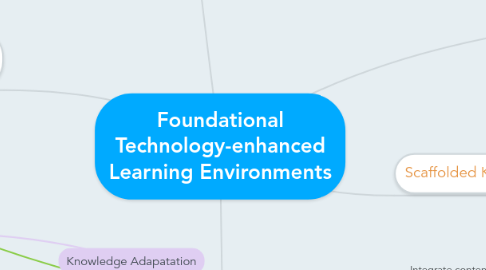
1. Anchored Instruction
1.1. Constructivist Generative Learning
1.2. Mathematical problem solving using realistic case studies
1.3. Independent learners and thinkers
1.4. Macrocontexts: common ground to communicate understanding
1.5. Strategies
1.5.1. Cooperative learning
1.5.2. Scaffolding
1.6. Affordances
1.7. Example: Jasper Project
2. Technology-enhanced Generate-Evaluate-Modify
2.1. Development of inquiry skills
2.2. Mental Models: Knowledge organization
2.3. Reasoning
2.3.1. Deductive
2.3.2. Inductive
2.3.3. Hypothetico-deductive
2.3.4. Abductive
2.3.4.1. hypothesis
2.3.4.2. visual representations
2.4. Strategies
2.4.1. Computer Simulations
2.4.2. Case Studies
2.4.3. Interactive Multimedia
2.4.4. Peer Critique
2.5. Steps
2.5.1. 1) Generate
2.5.2. 2) Evaluate
2.5.3. 3) Modify
3. Knowledge Integration Perspective
3.1. Multiple misconceptions
3.2. Students as scientists
4. Scaffolded Knowledge Integration
4.1. Inquiry
4.2. Scaffolded Knowledge Integration Framework
4.2.1. Visible Thinking
4.2.1.1. Inquiry Map
4.2.2. Accessible Science
4.2.2.1. Testing
4.2.2.2. Data analysis
4.2.3. Peer Scaffolding
4.2.3.1. Discussions
4.2.3.2. Peer review
4.2.4. Lifelong learning
4.2.4.1. Critiquing
4.2.4.2. Comparing
4.2.4.3. Rethinking
5. Learning for Use
5.1. Integrate content and processes of learning
5.2. Theories of Learning
5.2.1. Constructivism
5.2.2. Goal-directed
5.2.3. Situated cognition and cognitivism
5.2.4. Declarative and procedural knowledge
5.3. Steps
5.3.1. 1) Motivation
5.3.2. 2) Knowledge Construction
5.3.3. 3) Knowledge Refinement
5.4. Example: My World GIS
5.5. Strategies
5.5.1. Map drawing activity
5.5.2. Open-ended investigations

